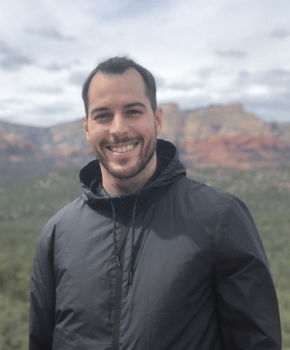Drink and Thinks are a virtual event we have every Friday afternoon internally at ZayZoon. We like to bring on cool and inspiring guests for a fireside chat and hear about their wins, losses and learnings from their journey. This gives an opportunity for the team to step back from the day to day work, unwind and think differently with a new perspective.
Jonathan Barlow has been a strength and conditioning coach to pro athletes for over a decade, training some of the greatest NFL, NBA, MLB and UFC fighters on the planet.
As you can imagine, there’s more to “strength and conditioning” than just lifting weights. Jon plays an immense role in these athletes' nutritional, and mental games too. He’s learned how to unlock the potential of young athletes with all the talent in the world but no drive… and also how to steer those that have all the drive they need, but no direction or focus. Jon’s one of the most genuine people I know and has an incredible sense of awareness for other people, which is what I believe makes him such a world-class coach.
In this episode of Drink and Think, Jon Barlow breaks down his journey working with professional athletes, the challenges he faces as a coach trying to break through to these athletes, with the goal of reaching their potential and value with persistence.
“You need to do the simple things savagely well” - Mark Verstegen, President and Founder of EXOS.
Building relationships, developing trust and creating value as a coach

Have you ever wondered how professional athletes are able to maintain such disciplined routines, eating habits and are able to stay so focused and consistent?
I wondered the same thing…
Until Jon offered some insight 👇
“It's funny that the professional athlete you see on TV, making millions of dollars and the person who works a normal, great job, are both very similar. They just do different things nine to five.
A lot of folks have this perception and I had the same idea before I started working with pro athletes, you see them on TV, whether it be for the NFL or the NHL or what not, and you think they have this intense desire to train and get better. You know, be bigger, faster, stronger. Though a lot of them are like you, or me, just trying to find motivation to get up off the couch and do something.”
The difference is these athletes just happen to be really good at their sport. Sure there are a few who have that desire to go above and beyond and to wake up early and do every little thing. But most of them, it’s not like that, which is why coaches try to help athletes reach their full potential and try to figure out ways that they can sustainably train for long periods of time.
I will never forget sitting down with a basketball player, he was a point guard. I think he played for the Milwaukee Bucks at the time, like a ten- or eleven-year veteran. He just told me, ‘I don't like lifting weights. I'm just here because my team wants me to be here. Like, I don't like this stuff.’
Hearing that as a coach, I have two instant thoughts. Number one, this is gonna be tough. Secondly, he is actually going to need some series coaching.
An athlete that doesn’t want to train or be there, creates a real challenge for a coach. It requires a lot more than just prescribing a workout for the client, it entails building a relationship with that individual and understanding them as a person and their personality traits. Becoming someone that they can trust is crucial. Learn what motivates them and try to create an environment where they want to be and can strive.
The overall goal is to provide them with value and try to bring the best out of them.
In this case, I was able to build that relationship with this athlete and create that environment. He ended up really enjoying the workouts and we found ways to work through that and train for a few years.
Though, that’s not always the case and sometimes it’s challenging to break through to these players.
Like one of the guys, this is a star, won't mention his name, but he was a draft pick. I was training for the NBA and he ended up getting drafted number one overall and the first meeting I had with him, the first session he was showing up to, we're gonna talk about his training. The guy was forty minutes late for the training. Okay, whatever. We'll let it pass, you know, it could have been traffic, what not. But then he insisted we couldn't start talking until his meal showed up.
It's like, alright, he's probably getting some healthy meals delivered. And it's a whole big truckload of Chick-fil-A, which is nothing against Chick-fil-A.It's tasty. But you think this number one, drafted NBA player would be eating like the healthiest stuff. Where he's actually getting his Coke, he's got like all his nuggets, he's got a couple sandwiches and he and his friends are just chowing down right in the nutrition lounge, you know, and so that just kind of gives you an insight.”
“Once we can build a relationship and establish some rapport and have that respect, they're more likely to listen to what you're gonna say. This guy wasn't. I mean, we worked together for two off-seasons. I never, never really broke through to him.
Here are the key takeaways
Throughout the interview Jon really emphasizes the importance of consistency. This is a key learning that really hit home for the team. It’s about creating an environment and balance to have a sustainable lifestyle that allows you to be consistent over the long term. Finding a system that works for you.
Sustainable way of living → Consistency → Success
Creating a sustainable way of living:
- When it comes to workout routines, diet and rest, it’s important to stick to the basics. Create a balanced lifestyle that you can see yourself following long term.
- Ask yourself: “What are sustainable rhythms that I can do forever?“
- It’s important to avoid extremes. Avoid hopping on the newest and hottest workout trends or diets. They allow opportunities for failure, as most are usually fads. It’s not bad to explore and discover what works for you, but when you find something it’s best to stick with it and stay consistent.
Consistency:
- Creating a balanced lifestyle that is sustainable long term is what works with consistency. It creates less friction and makes daily habits feasible.
- Adapting to life's rhythms is a key way to stay consistent. A lot of us like to think we don’t have time to do that hour-long workout and decide to push it off until the next day. That thought is what breaks consistency. If you only have time for a fifteen-minute workout, it’s worth getting in there and keeping that momentum and daily habit alive. It’s important to show up, especially when you don’t feel like it.
“I could just see right away looking at one of the athletes walking in, oh man, this is not his day, you know? But he still has shown up and still is there. To put good quality work in and, I call those days the gamechanger days.”
Adapting to life’s rhythms is something that everyone can learn to do. Life gets busy, things happen and plans change. There are always excuses to push things off until the next day and it's hard to find time to focus on routine. Learning to create momentum and sticking to the small habits that are going to have long-term gains is what creates consistency. Creating a sustainable way of living will help your future self with long-term success.







